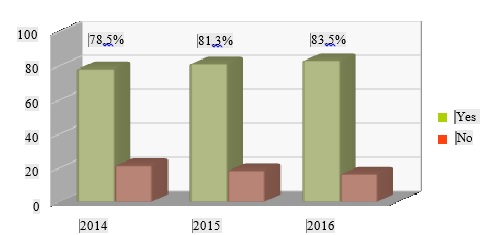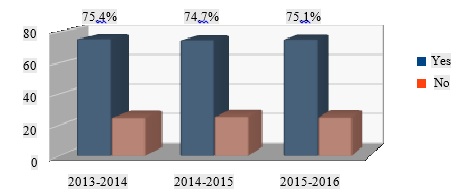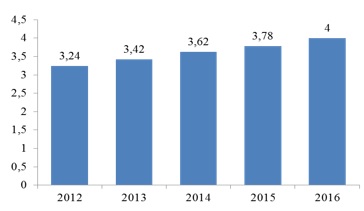Abstract
The issues of the education quality monitoring at the Siberian State University of Science and Technology are considered, using data on the absolute and qualitative achievements of students of technical and economic specialties, as well as the results of the questionnaire survey of students and teachers for the period 2012-2016. Methods of pedagogical diagnostics and testing, pedagogical observation, conversation, questionnaire, statistical processing of experimental work results and analysis were used. In the process of questioning were involved 644 students of the Mechanical Engineering and Mechatronics Department, 627 students of the Economics Department and 329 teachers. Based on the results of the student questionnaire survey the degree of students' satisfaction with the quality of teaching was revealed and the assessment of teachers by the students on the average score was carried out. The dynamics of the degree of students' satisfaction with the use of technical means by the teachers in training for three years is analyzed. It is found that with comparable absolute and qualitative academic achievements of students of technical and economic departments, representatives of economic specialties estimate the average score of the teacher lower than representatives of technical specialties. The use of active forms of training by the teacher is estimated by students of economic specialties also lower than by students of technical specialties. Teachers of the technical department evaluate the students higher, because they consider them not as an object of evaluation, but as full partners in joint activity.
Keywords: Educationquality assurancestudentsacademic achievement
Introduction
In modern conditions significantly increase the demands on the level of student training. In this regard, the university is obliged to provide its graduates with a quality education that envisions the ability to effectively use, replenish and update knowledge, professional skills, and take into account the employers ' requirements for the content of specialists training. The task of improving the quality of education is a prerequisite for the training of qualified specialists.
Educational institutions of higher education can be considered one of the most difficult to manage. They are characterized by a high level of personnel potential, the complexity of the services provided, the great social significance of their activities results, the long life cycle of the services provided, the historically established independence and autonomy of the pedagogical staff, the teacher's freedom in choosing the teaching techniques. There are many other specific characteristics, which cause problems in the creation and maintenance of the quality management system at the University (Vostrikov et al., 2003; Struminskaya, 2015).
The creation of the university's quality management system is one of the strategic tasks of the university (Nikitina, 2003). Monitoring the education quality at the university is an integral part of the university's quality management system. Monitoring the education quality allows to receive complete and objective information about the quality of education, more effectively control the educational processes, identify problems and make timely decisions about adjusting the educational process. Monitoring of the educational process quality is understood as monitoring on a continuous basis of the dynamics of the educational process quality, fixing certain criteria and parameters of its state and emerging problems.
Monitoring of the education quality at the university is defined as the quality control of the educational program (Antropov & Tarasian, 2015). The most important component of the evaluation of the educational program quality is the monitoring of the satisfaction of stakeholders with the results of education (Belash et al., 2015). The main indicators of monitoring are continuity, systemic nature, the ability to identify problems and the dynamics of changes (Zvonnikov & Chelyshkova, Shishov & Kalney, 2008).
The system of quality monitoring and quality assurance of education in a higher educational institution in accordance with the criteria and standards of the Russian Association of Engineering Education is also an important (Dugarova et al., 2016). At the same time, a step by step analysis of international and Russian approaches to assessing the quality of training programs was conducted to determine the content of quality control and quality assurance of engineers training.
Problem Statement
To ensure the quality of specialists training at the university and to achieve the required level of education, it is necessary to obtain reliable, sufficiently complete and differentiated by levels of use information on the conformity of processes and educational results to regulatory requirements, ongoing changes and predicted trends, which is possible with the use of continuous monitoring of the education quality.
Research Questions
Are there any differences in the assessment of the education quality of students of technical and humanitarian specialties?
Purpose of the Study
To establish the peculiarities of the education quality of students of technical and economic specialties of the Siberian State University of Science and Technology using data on the absolute and qualitative achievements of students, as well as the results of the questionnaire survey of students and teachers for the period 2012-2016.
Research Methods
Methods of pedagogical diagnostics and testing, pedagogical observation, conversation, questionnaire, statistical processing of experimental work results and analysis were used. In the process of questioning were involved 644 students of the Mechanical Engineering and Mechatronics Department, 627 students of the Economics Department and 329 teachers. To assess the effectiveness of the education quality system, a set of criteria-oriented test tasks was developed.
To assess the significance of the differences, we used the parametric method of statistical evaluation of the Student's t-test for independent data set. The test for the normal distribution of characteristics was carried out for its correct use. All data set had a normal distribution. The critical value for the independent data set is 1.992.
In the survey took part 1271 students in accordance with the Table
Findings
During the monitoring, three stages were identified. At the first stage (normative) the goal, tasks and objects of monitoring were determined, the choice of criteria and methods of monitoring, the frequency of information collection and interpretation of the results were carried out. At the second (analytical-diagnostic) stage the information was collected, the quantitative and qualitative processing of the obtained results was carried out, as well as the systematization of the obtained data and their analysis. At the third (final) stage, the quality of graduates' training was evaluated, the conclusions and proposals were formulated to improve the educational process at the university and make appropriate managerial decisions.
The university monitoring was based on the following principles:
• Principle of an integrated approach;
• Principle of ensuring objectivity and completeness of information;
• Principle of open access to information;
• Principle of systematic analysis.
It should be noted that the quality of the result of the educational process is determined by the degree of the formation of professional competence. This competence should be considered as an integral characteristic of the professional and personal qualities of the future graduate. Then the competence indicators are educational achievements and personal qualities of students (interest in learning activities, ability to self-organization, ability to work in a team, etc.). The quality of the educational process also depends on the meaningful provision of education (compliance with the requirements of educational standards, the quality of the curricula and educational programs), the use of modern interactive technologies, modern technical means, the quality of teaching and qualifications of teachers, the information and organizational support (the optimality of the training sessions schedule, the effectiveness of the laboratories work, libraries, etc.).
First, let's look at the data of the analysis of the absolute and qualitative academic achievements of students of technical and economic specialties for the period 2012-2016.
Absolute academic achievement is equal to the ratio of the number of students who passed all the exams in the session, to the number of students required to take exams. Qualitative academic achievement is equal to the ratio of the number of students who passed all the exams for good and excellent, to the number of students who passed all the session exams. Of course, these indicators do not reflect the participation of students in scientific work, competitions and Olympiads. However, this is a quite practical criterion for assessing the success of training, the measure of mental development, the adaptive capabilities of students, the responsibility for the timely surrender of the session (Okuneva, 2014). Therefore, as a criterion for the education quality, we will consider data on examinations received during the session.
Tables
The results presented in Tables
Next, we present the results of the questionnaire survey of students.
Using the questionnaire of students, it is possible to carry out monitoring, during which it is possible to assess the quality of teaching and the quality of the provision of educational services. Periodicity of the questionnaire on the evaluation of the quality of teaching was conducted once a semester, and in assessing the quality of the provision of educational services once a year. The questionnaire is better conducted in electronic form. In this procedure, a systematic approach is important, and not a one-off questionnaire. Annual information allows us to conduct comparative analytical work, to obtain more objective information to improve the effectiveness of the university activity and the work of teachers. In addition, this analysis can be carried out in the context of institutes (departments).
For students, the questionnaire is an opportunity to highly appreciate the teacher and thank him for interesting studies, new knowledge and a kindly attitude, or, on the contrary, the opportunity to declare non-observance of study time, absence of interrelation between theory and practice and other topical problems, evaluate the organization of the educational process, etc. The opinion of students and graduates as direct participants in the educational process in these matters is a timely "call" for the operational management of the process.
According to the results of the semester questioning of students "Teacher Assessment", a high degree of students' satisfaction with the quality of teaching was revealed. Students in the autumn semester of 2016-2017 academic years evaluated the work of teachers on average by 4.55 points on a five-point scale. The average score of teachers according to students' estimates for 5 years is presented in Table
The results presented in Table
An analysis of existing experience has shown that at present only a small part of the universities conducts a systematic study of students' opinions about the quality of teaching and makes management decisions on this basis. In general, these are universities in which their own quality management systems are created and effectively operated, focused on the implementation of the requirements of internal and external customers, and therefore, primarily, students (Chandra, 2014).
It is important not to confuse the evaluation of the teaching process and the evaluation of the teacher's personality, that is, the student's relationship to the teacher. Evaluation of the teaching process is, first of all, an assessment of the quality of the teacher's work. One can agree with O. Merkulova, who notes in this regard that the requirement of change in the personality of the teacher is a human rights violation, and the requirement of changes in the work performed is quite legitimate action of the university administration (Merkulova, 2005).
Table 5 presents the results of the questioning of students on the question of how the teacher uses active forms of training (business games, discussions, etc.).
The results presented in Table 5 show that there are significant differences since 2012 in the assessments of teachers by students of technical and economic specialties. Students of economics profile significantly lower evaluate their teachers who actively use interactive forms of education.
Figure

It should be noted that the real employers consider the knowledge, skills and practical experience of graduates in the context of the ability and willingness to effectively apply them in practice, meet the quality standards of the industry and regional markets. One way to solve this problem is to implement a practice-oriented approach. This approach in vocational training is aimed, first, at bringing the educational organization closer to the needs of practice and industrial enterprises. Secondly, it allows creating conditions for the purposeful formation of the competitiveness of future specialists.
Therefore, the questionnaire survey of students and graduates of the University for the satisfaction of the quality of the organization of production practices is important.
According to the results of our research, only 75% of university graduates are satisfied with the quality of the organization of production practices, while the rest 25% of graduates remained unsatisfied (Fig. 2).
It should be noted that the method of projects is important in practice-oriented learning. At the core of the project method is the development of cognitive skills, the ability to independently design their knowledge, the ability to navigate in the information space. The project method assumes the need to integrate knowledge, skills to apply knowledge from various fields of science and technology (Polat, 2012). The integrated system of engineering personnel training for industry using innovative technology of project-oriented training of students is actively developed in the Siberian State University of Science and Technology for several years in cooperation with the industrial partner of JSC "Information Satellite Systems" (Kovalev, Loginov & Zelenkov, 2015). The university has extensive experience in organizing production practices for students.

Figures

The data obtained suggest that the teachers of the technical department are more appreciative of the students, since they are not considered to be the object of evaluation, but as full partners in joint activities.

Conclusion
The analysis of absolute and qualitative achievements of students of technical and economics specialties for the period 2012-2016 is carried out. Based on the results of the student questionnaire survey the degree of students' satisfaction with the quality of teaching was revealed and the assessment of teachers by the students on the average score was carried out. The dynamics of the degree of students' satisfaction with the use of technical means by the teachers in training for three years is analyzed.
It is found that with comparable absolute and qualitative academic achievements of students of technical and economics departments, representatives of economic specialties estimate the average score of the teacher lower than representatives of technical specialties. The use of active forms of training by the teacher is estimated by students of economic specialties also lower than by students of technical specialties. Teachers of the technical department evaluate the students higher, because they consider them not as an object of evaluation, but as full partners in joint activity. The obtained results allow to analyze the quality of education in University and to adjust the priority actions to improve the quality of training.
Monitoring the training of graduates, on the one hand, makes it possible to correlate the actual state of affairs with what was planned, and on the other hand, facilitates the planning of activities to improve the organization and implementation of the educational process during analysis, development of marketing and other strategic directions of the University. Thus, the university monitoring of graduates' training can be viewed as a means of managing the quality of the educational process.
Monitoring the teaching quality in the University on the basis of feedback from students is of great importance for the effective management of the quality of education, since it allows more clearly to identify the strengths of this process and areas for improvement. Overall analysis confirmed that, for quality monitoring to have an impact on student learning, the emphasis must be on curriculum, learning, teaching and assessment.
.
References
- Antropov, V., & Tarasian, M. (2015). Monitoring of training quality in University. Modern problems of science and education, 1(1), 3-8.
- Belash, O., Popov, M., Ryzhov, N., Ryaskov, Y., Shaposhnikov, S., & Shestopalov, M. (2015). Research on university education quality assurance: methodology and results of stakeholders’ satisfaction monitoring. Procedia - Social and Behavioral Sciences, 214, 344-358.
- Chandra, M. Yu. (2014). Technology of the monitoring teaching quality in the university. Discussion, 4 (45), 139-145.
- Dugarova, D. T., Starostina, S. E., Kimova, S. Z., & Kazachek, N. A. (2016). The system of monitoring education quality and quality assurance at the higher educational establishment in accordance with the criteria and standards of the Russian association for engineering education. Indian Journal of Science and Technology, 9(27), 1-13.
- Kovalev, I., Loginov, Y. & Zelenkov, P. (2015). An integrated system of training engineers for aerospace industry in Siberia using innovative technology of the student project-and-team work. Procedia – Social and Behavioral Sciences, 174, 537-543.
- Merkulova, О.P. (2005). Interrogative methods in the system of supporting the educational process quality. Volgograd: Peremena.
- Nikitina, N. (2003). Technology of continuous certification of students as an element of the monitoring education quality system in the university. University management: practice and analysis, 5-6(28), 84-88.
- Okuneva, T. G. (2014). Perfection of the training quality assessment of engineering personnel for the enterprises. Vestnik SibSAU, 4(56), 282-287.
- Polat, E. S. (2012). Method of projects. Electronic resource: (http://nsportal.ru/user/667/page/metod-proektov-istoriya-i-praktika-primeneniya).
- Shishov, S., & Kalney, V. (2008). Conceptual problems of the general education quality monitoring. Moscow: NTSSiMO.
- Struminskaya, L. M. (2015). Internal monitoring of the education quality. Professional education in the modern world, 4(19), 65-75.
- Vostrikov, A. S., Pustovoi, N. V., & Afanasyev, Y. A. (2003). The quality management system in a technical University: The experience of the Novosibirsk state technical university. University management: practice and analysis, 2, 78-85.
- Zvonnikov, V., & Chelyshkova, M. (2008). Modern means of evaluating learning outcomes. Moscow: Academy.
Copyright information

This work is licensed under a Creative Commons Attribution-NonCommercial-NoDerivatives 4.0 International License.
About this article
Publication Date
16 October 2017
Article Doi
eBook ISBN
978-1-80296-030-3
Publisher
Future Academy
Volume
31
Print ISBN (optional)
-
Edition Number
1st Edition
Pages
1-1026
Subjects
Education, educational psychology, counselling psychology
Cite this article as:
Kovalev, I. V., Loginov, Y. Y., & Okuneva, T. G. (2017). Education Quality Monitoring Of Students Of Technical And Economic Specialties. In Z. Bekirogullari, M. Y. Minas, & R. X. Thambusamy (Eds.), ICEEPSY 2017: Education and Educational Psychology, vol 31. European Proceedings of Social and Behavioural Sciences (pp. 579-588). Future Academy. https://doi.org/10.15405/epsbs.2017.10.55

